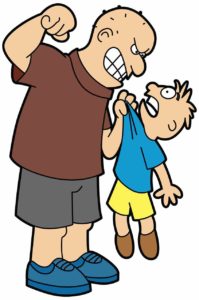Bullying is everywhere these days from Kindergarten to presidential politics. It makes my stomach ache. Let’s share some thoughts on it.
Bullying is not innocent child play; it is an evil act of meanness. Defined as, “repeated, usually aggressive, behavior that is intended to hurt, scare, or cause harm and distress.” It cannot be tolerated, yet each day more than 20% of school age kids are bullied!
Psychologists describe several types of bullying. Physical bullying consists of hitting, beating, or otherwise causing injury to the victim’s body. Verbal bullying is marked by teasing, taunting, threatening, or extorting money or possessions. A more subtle type of verbal bullying, often called psychological bullying, includes making false accusations and spreading malicious gossip about the victim. Cyber-bullying is an example of this type, so is exclusion from socially popular ‘in” groups and “clicks.”
The effects of bullying can be devastating, and include anxiety, depression, and suicide. These and other vague somatic symptoms and illness result in more than 150,000 American kids missing school every day.
It’s often difficult to know if your child is being bullied. Many times bullies have threatened them with increased violence if they tell. Some sighs to look for are sadness, short tempers, crying, and poor sleep habits. Bullied kids may start to dislike school, not want to walk to school anymore, may refuse to ride the bus, or want to quit school. Unexplained bruising may be a sign of physical brutality!
If you chil d gives away some of his prized possessions or says he won’t be around much longer he may have a serious depression, and is thinking of taking his own life. These signs and symptoms demand immediate evaluation by a physician or mental health worker.
d gives away some of his prized possessions or says he won’t be around much longer he may have a serious depression, and is thinking of taking his own life. These signs and symptoms demand immediate evaluation by a physician or mental health worker.
Too often kids are told to “man-up,” “don’t let it bother you,” “if he hit you learn how to fight.”
Other parents may say: “Kids are mean, so are adults, get used to it.”
Whereas these remarks are made with the best of intentions they are rarely effective and can lead to more serious depression and suicide ideation.
As in so many problems, prevention is so much more effective than treatment. First, establish a strong link between your child and you, your family, and your community, especially school. Make sure they feel part of the family and community and feel needed.
Coaches, teachers, friends, and youth ministers may not be able to help solve the problems that accompany being bullied, but they can inform you or other authorities that something is going wrong.
If you have a strong relationship with your kid he or she will feel comfortable talking to you about this or any other issue. Developing this relationship must begin long before trouble arises. Family meals, without TV, I-pods, radios, or cell phones are so important. Every night is not too often to eat together. Family outings, like hikes, skiing, swimming, and ball games also have a bonding effect, so does doing chores together – washing the car, planting a garden, even cleaning or cooking.
Watching TV or a movie together does not often lend itself to building a relationship. These type of media do not give you or them the opportunity to ask a question or make a comment, and they often teach values you don’t want them to have.
Second, you should promote development of self esteem. There is so much talk today about how that is done. Many “experts” seem to think you can give your child self esteem by throwing out unearned compliments. But, while true, earned compliments are very important in teaching kids that they are needed and can do a good job, the bottom line is you cannot improve his/her self esteem. It must come from inside them. Chores and home work, which they do by themselves, are two of the best ways to develop self confidence and self esteem.
If you suspect your child is being bullied, stay calm. Don’t interrogate her or give her the third degree; even close family members resent that. Rather, ask what the bully scene is like at their school. Nod and accept what the kids tell you. Then ask if he or she knows anyone who has been bullied or is a bully. Find out what the bullied kid did about it; inquire if it is still going on. Sympathize with the victim. Then ask if he or she has ever been bullied. If so, ask what she thinks should be done about it. Then after you have listened to her, she will most likely ask what you think. If not, she will listen as the two of you work out a plan.
The plan should include a way to gather information, and whom to call after information is in hand. I would start with calling the bully’s parents, but remember, bullies often have bullies as parents, or no parent at all. If that is not effective and usually it is, talk to the principal at school or the place where the bullying is taking place. And finally, if it continues, it is your responsibility to inform the police.
But, remain calm; do not threaten the bully, his parents, or the school. You don’t want your child to think he has a bully for a mom or dad.
And that brings us to the bully themselves. Most bullies are hurting emotionally and have a poor self-image. Many have been abused and bullied by their own families. And sadly some 60% of them will be convicted of a violent crime by age 24. Forty percent will have been convicted 3 or more times.
Finally, don’t be a bully; be nice!
Be the person you want your child to become. Because your kids will become you unless they make a very concerted effort not to!

